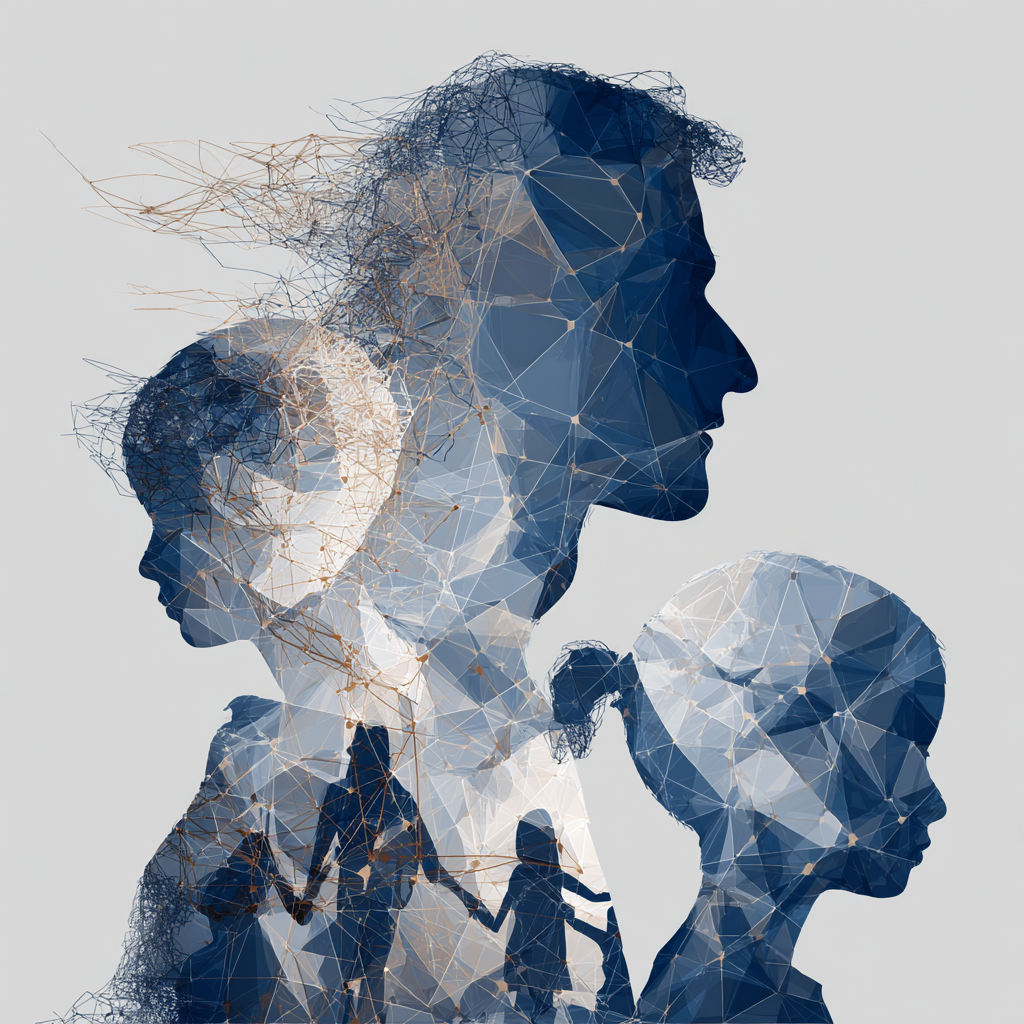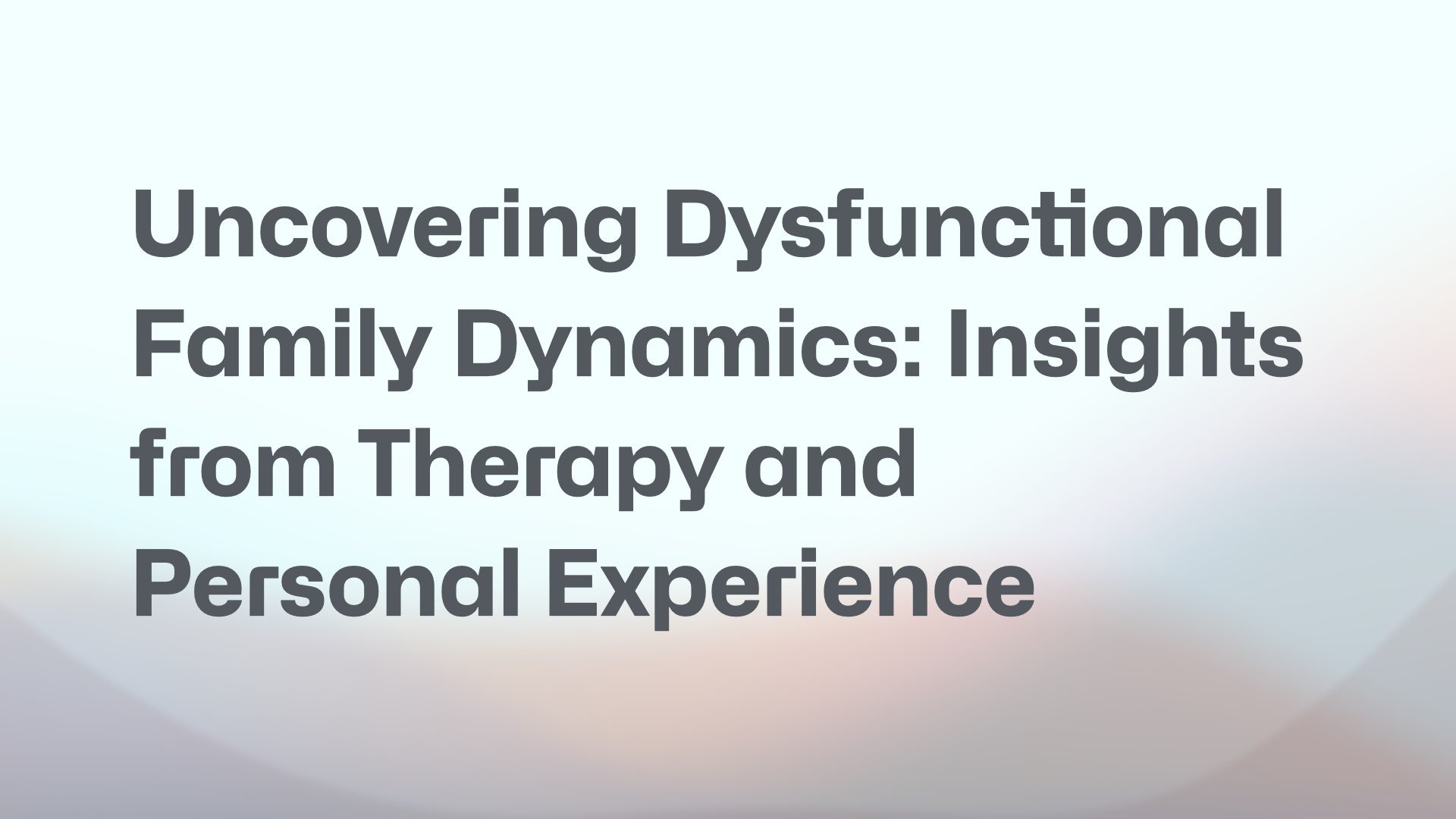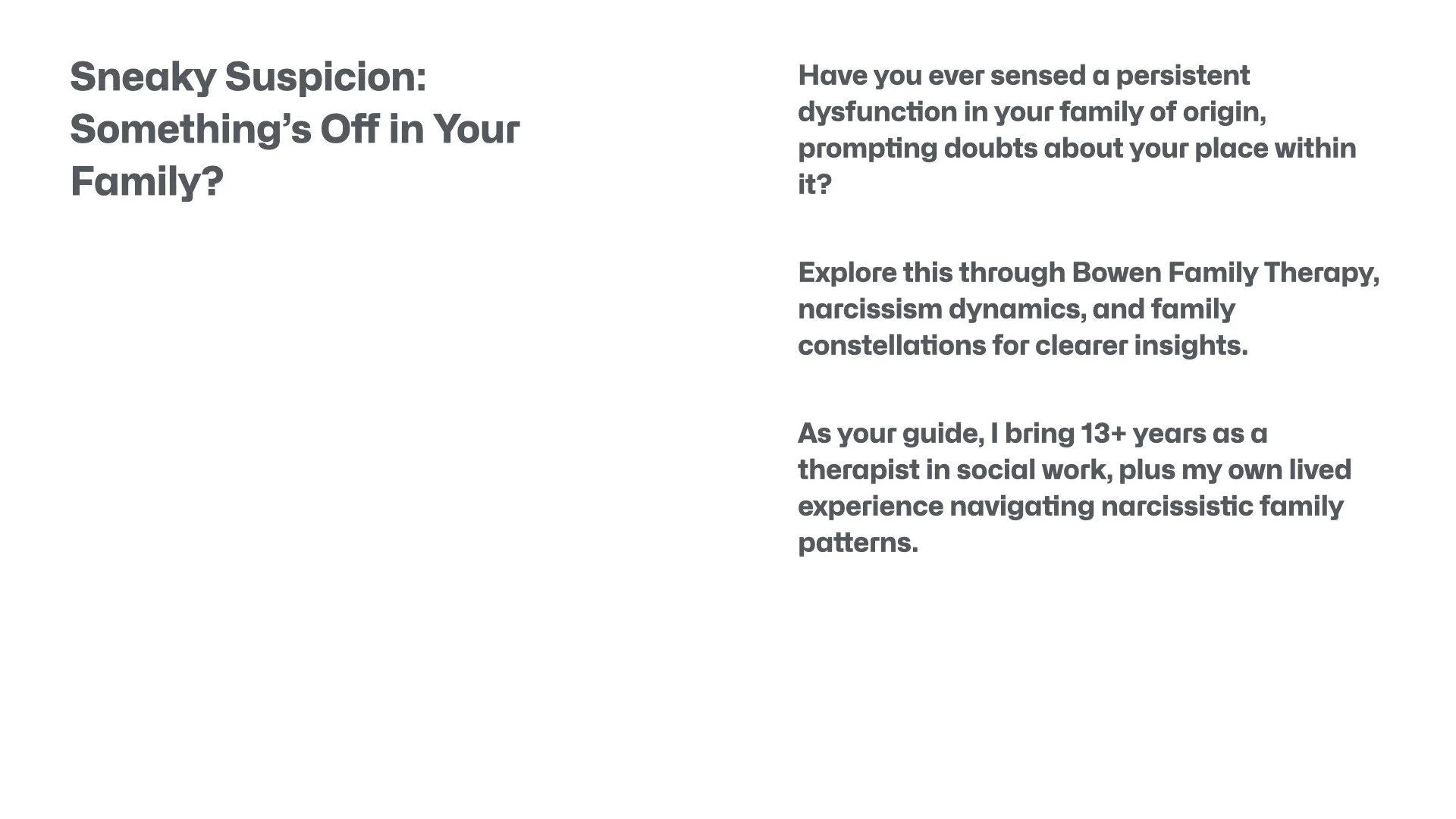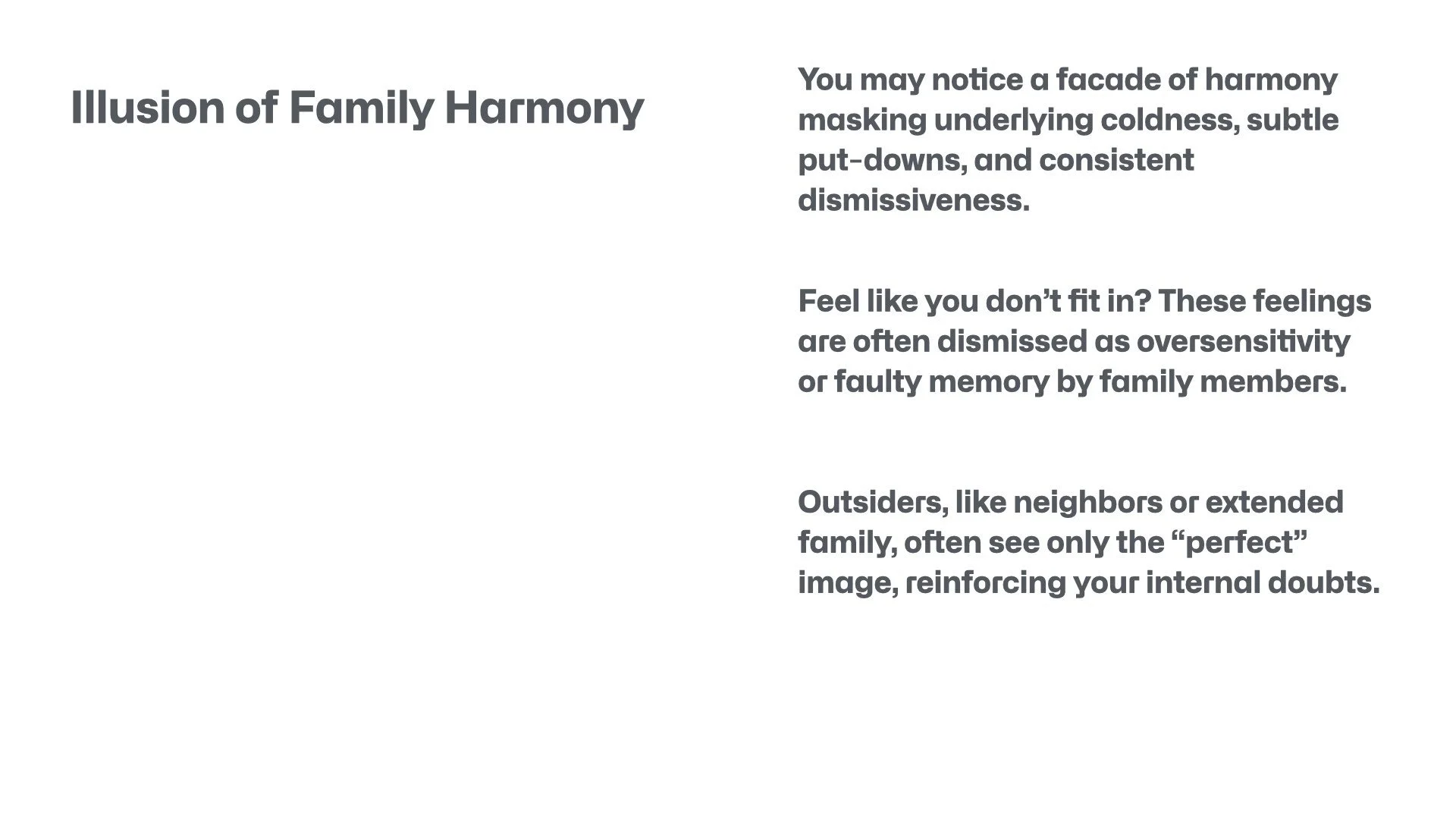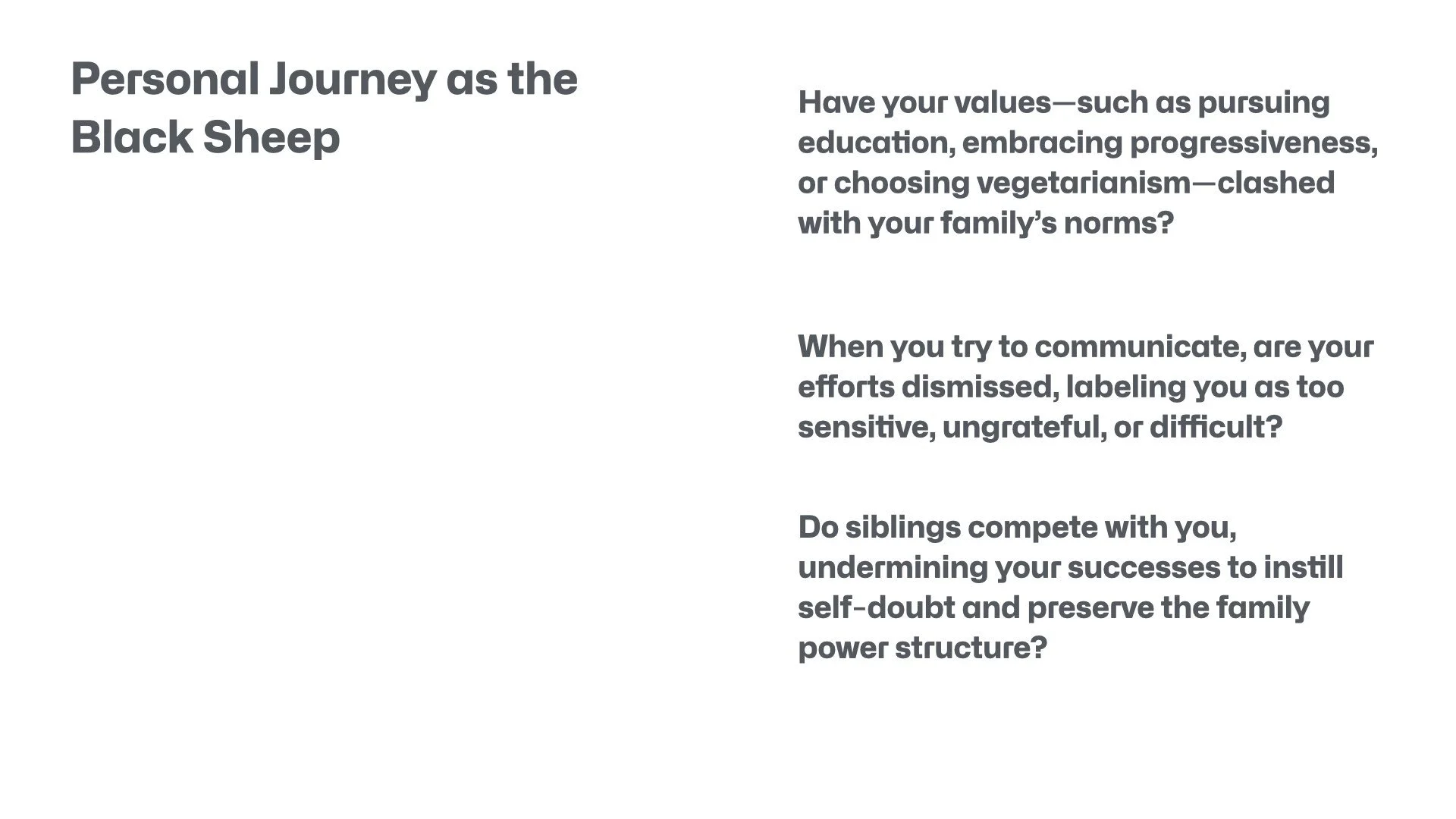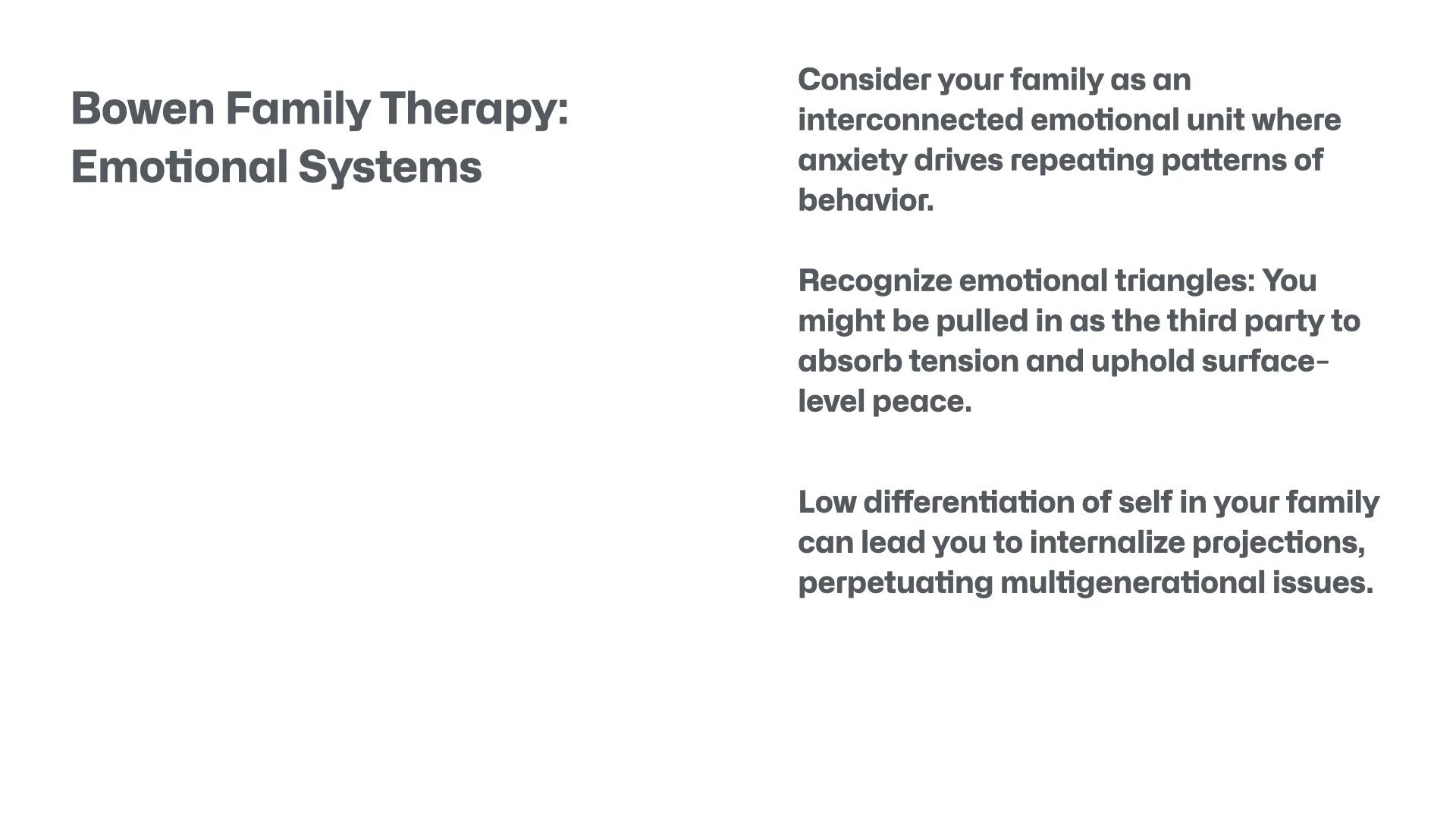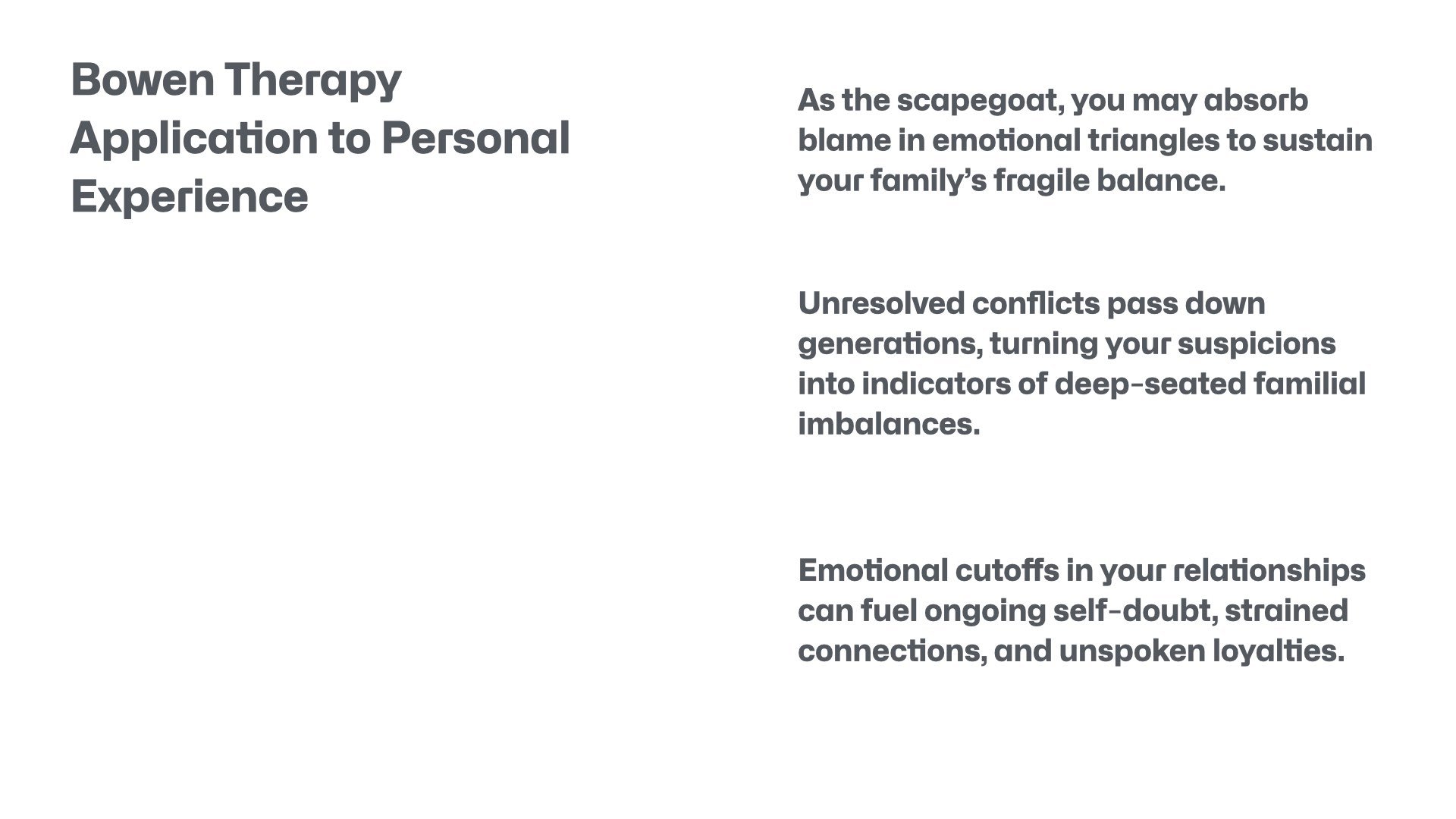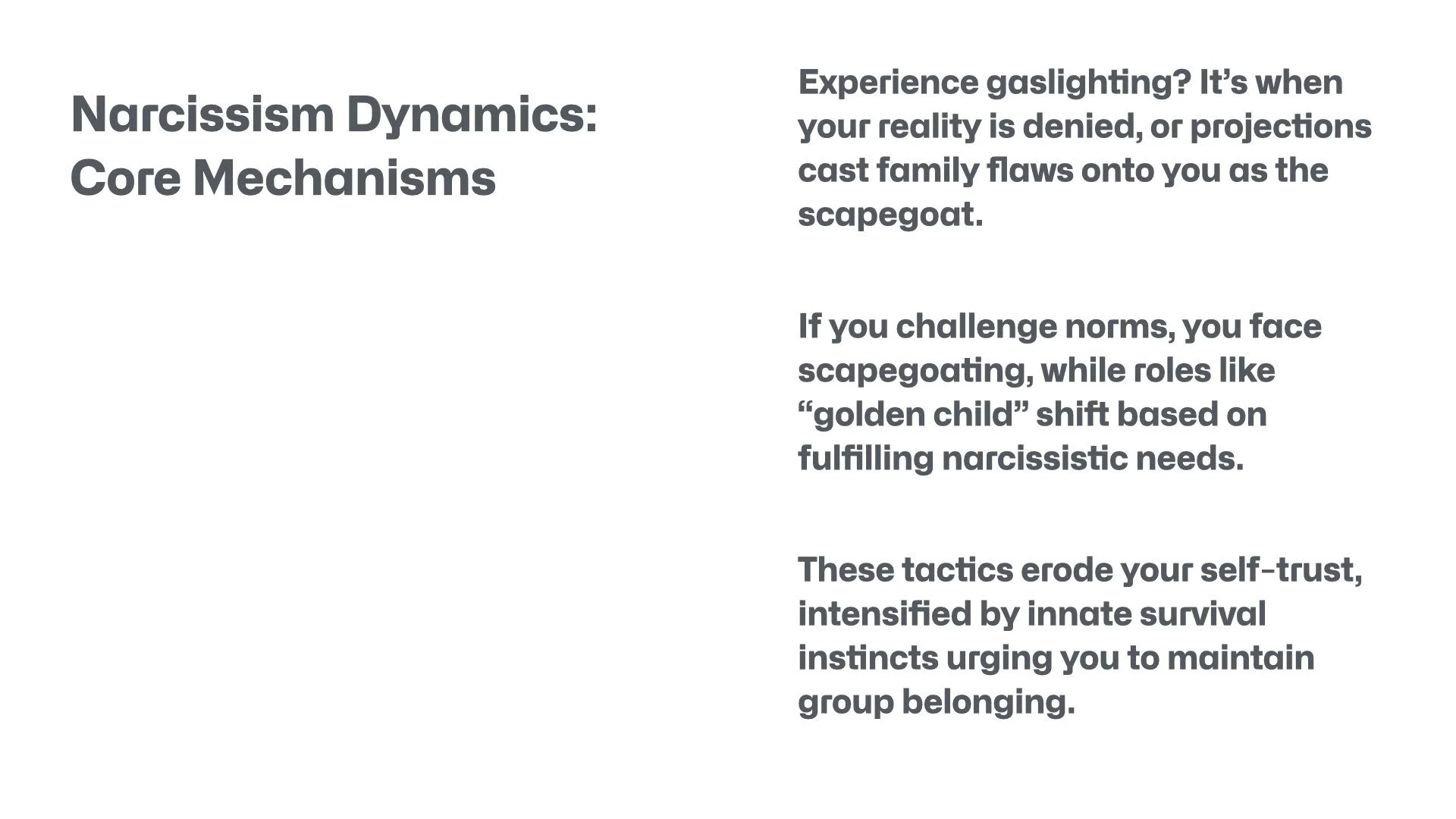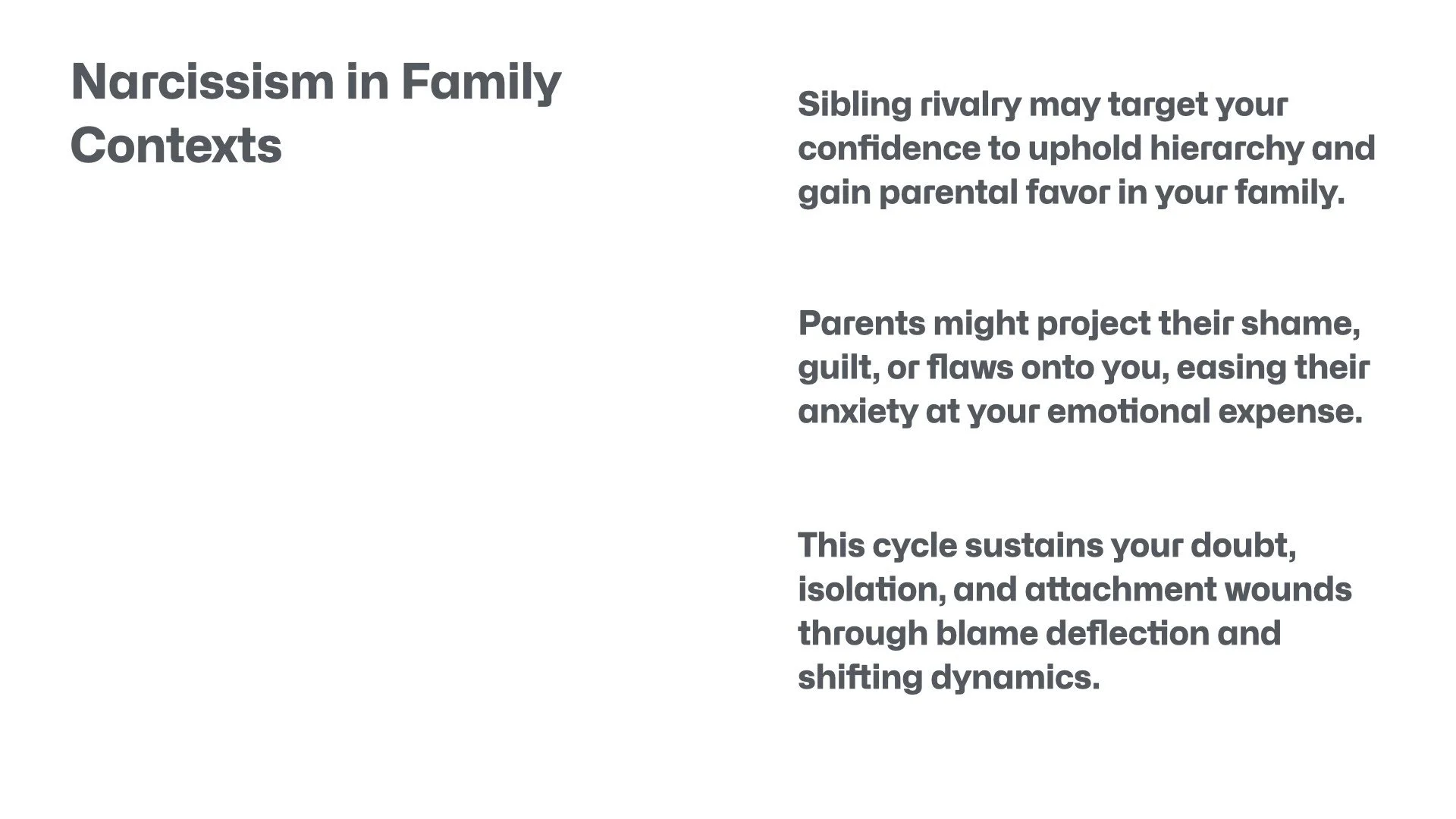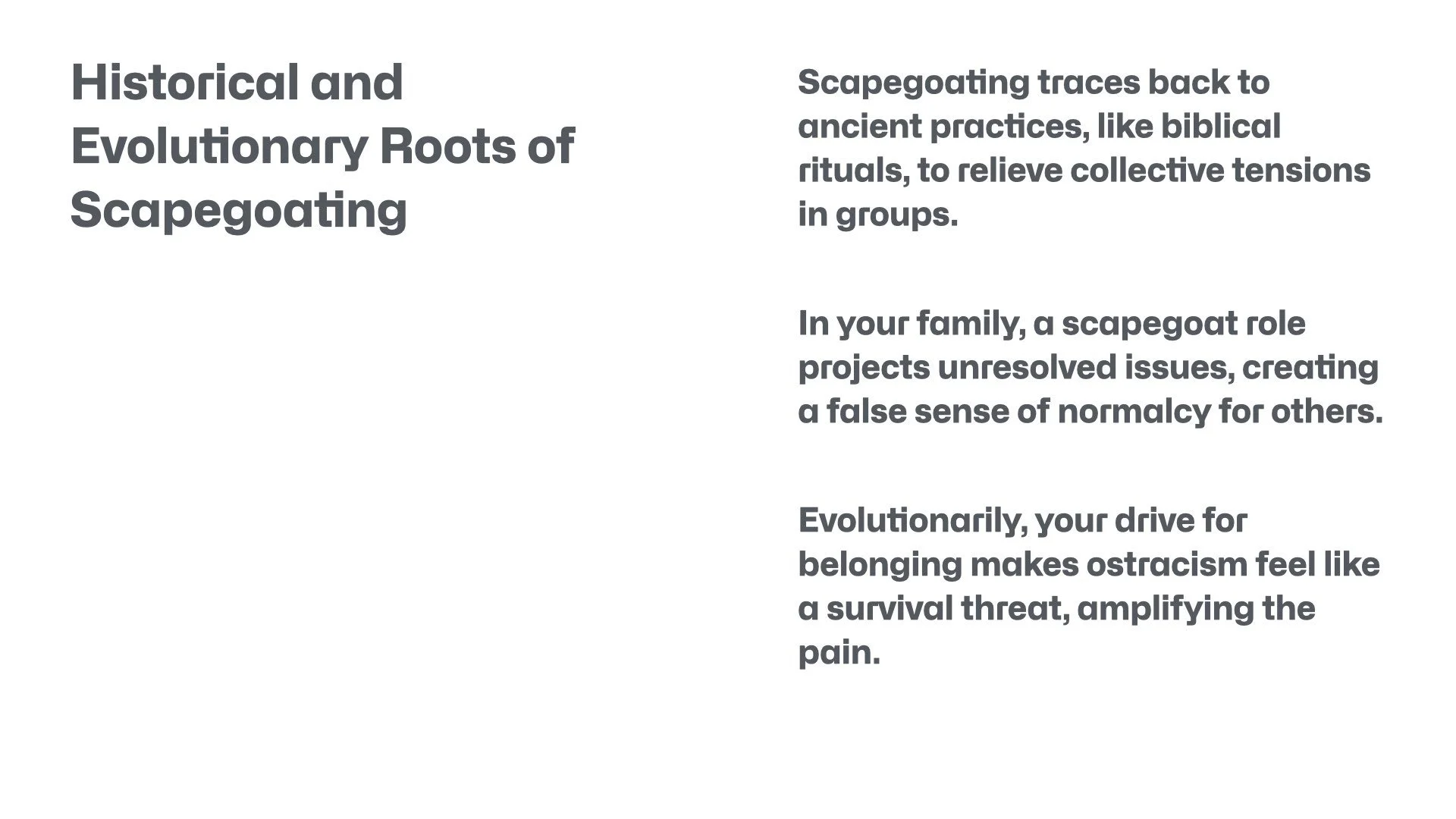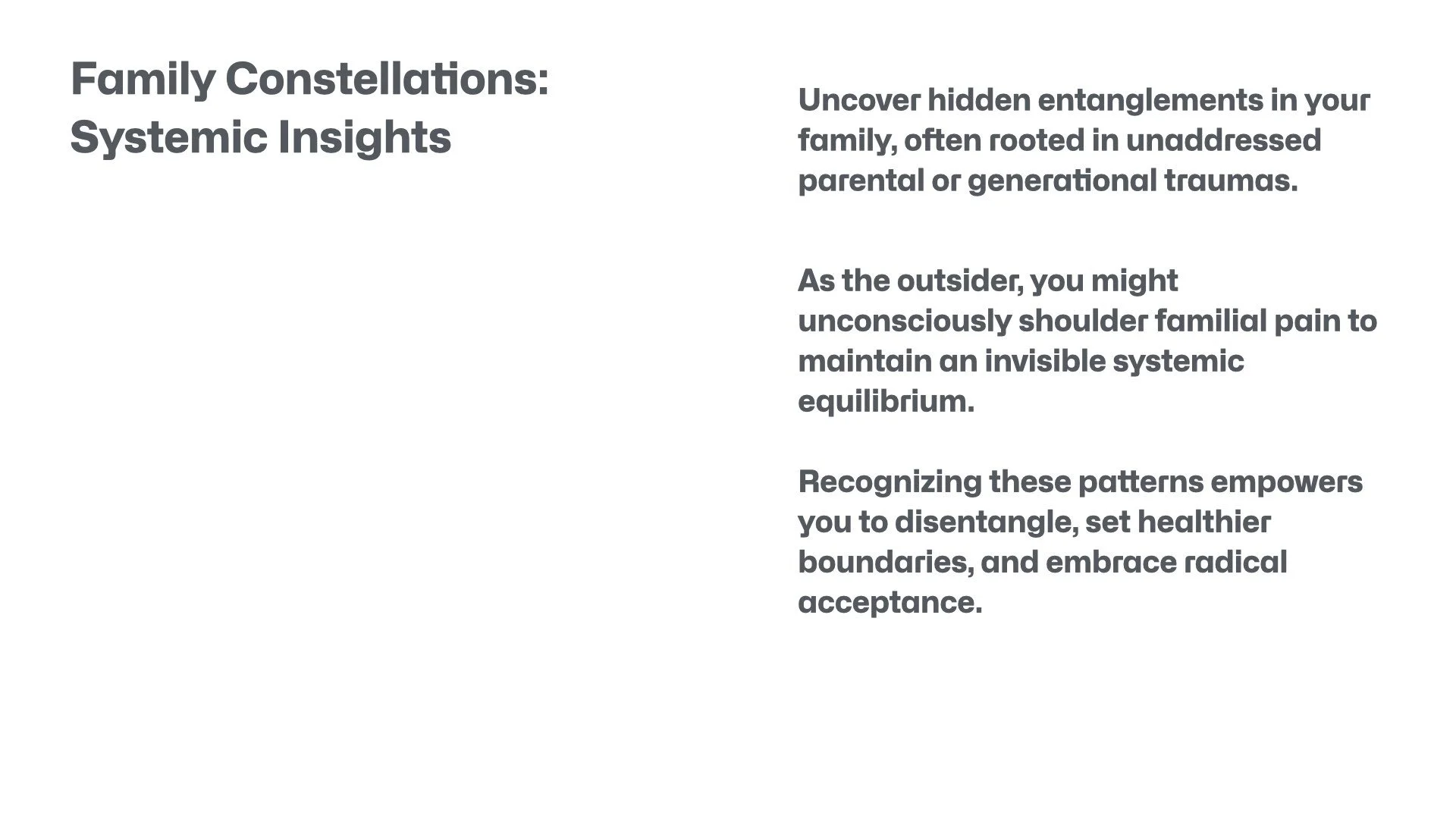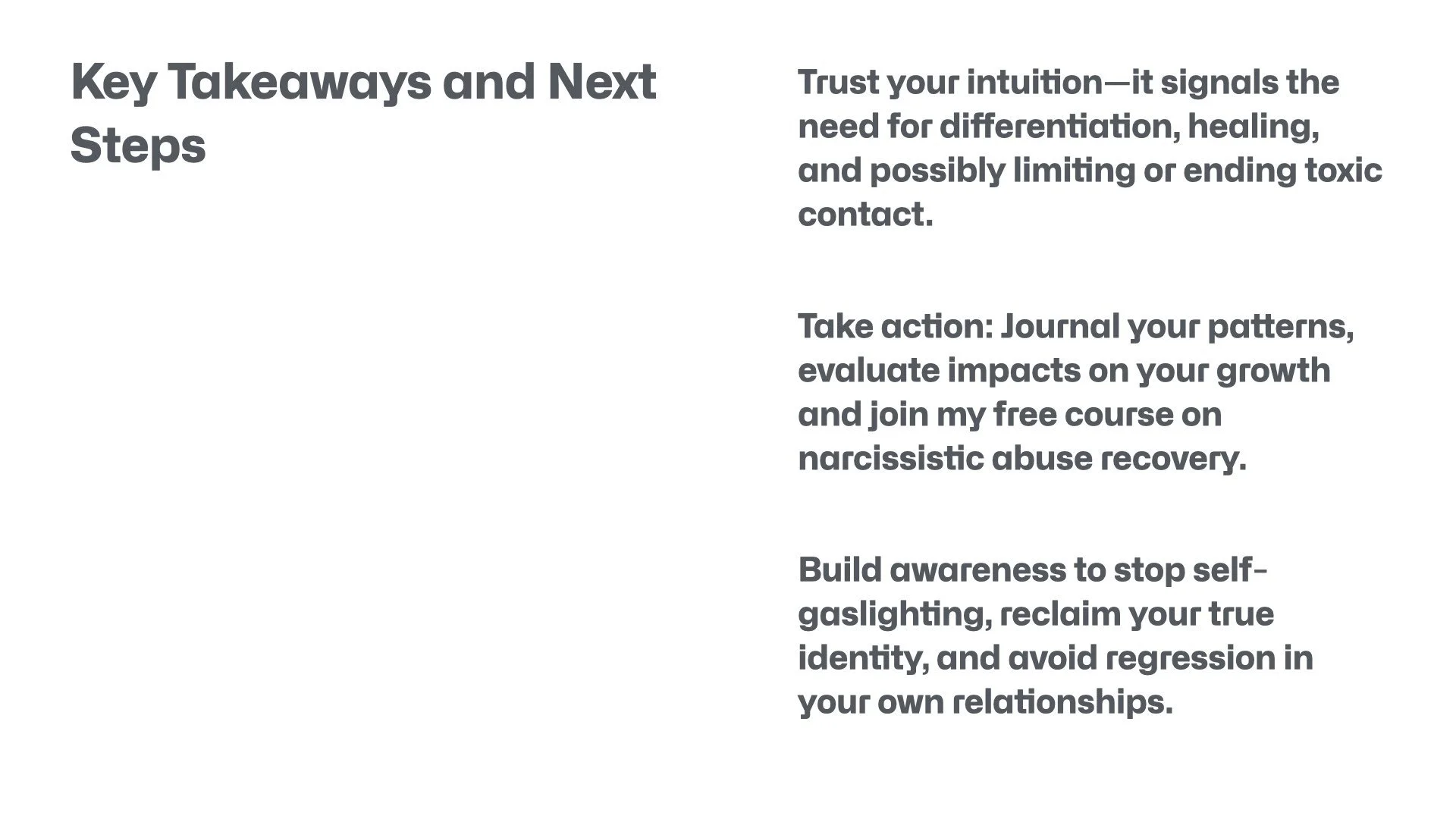Unmasking Family Dysfunction: The Scapegoat's Path to Healing
Introduction: That Persistent Feeling Something's Wrong
Have you ever had that sneaking suspicion that something is off with your family of origin? In that you've tried different ways to communicate with them after perhaps a blow-up, or they don't ever acknowledge or recognize when they are at fault? You feel like the black sheep or the scapegoat of the family. If this resonates, you're not alone—many high-functioning individuals grapple with these subtle yet profound dynamics, often rooted in narcissistic abuse or emotional immaturity.
In this blog post, which supplements my recent YouTube video on the topic, I'll dive deeper into understanding this dynamic from various lenses, particularly Bowen Family Therapy, as well as from a narcissistic abuse perspective. I'll also pull from approaches like family constellations to offer a holistic view. My name is Blake Anderson, and I'm a registered social worker and therapist here in Toronto, Ontario, with over 13 years of experience in this area.
Whether you're searching for "scapegoat in family recovery" or "narcissistic family dynamics healing," this post aims to validate your experiences and provide actionable insights to move forward.
The Illusion of Harmony: Surface-Level Peace Masking Deeper Issues
It's essential to first understand that there's an illusion of harmony in these families. So on the surface, there's a perception that there's harmony, but really this is contrasted with the underlying coldness and subtle put-downs that you often experience. From the outside looking in, the family of origin that's considered narcissistic or dysfunctional gives the perception that everything is harmonious—there's a sense that there is a caring, loving family.
But in reality, there is again this coldness and put-downs often from the parents or siblings. This facade can be especially confusing when outsiders, like neighbors or extended family, reinforce the "perfect" image, leaving you questioning your own reality. If you've felt dismissed as "too sensitive" or accused of misremembering events, this is a common tactic in narcissistic family patterns that erodes self-trust over time.
The Scapegoat Role: Fixed or Shifting, But Always Burdensome
The notion of the scapegoat can be one child that is targeted throughout the course of the family. There can also be shifting loyalties throughout the family, and depending on who's the favorite, this can shift depending on where the parents are putting their attention. So if one child is, let's say, exceeding in school or perhaps has a new job or a new partner, then maybe temporarily that child can become the golden child.
But over time, perhaps maybe their job isn't as good as another sibling, or maybe they break up with their boyfriend or girlfriend, and this leads the family to shift. And as that child is not giving the narcissist parents the supply they crave, they become the scapegoat. Or due to the personality of the child or just the way the child is—in terms of maybe being a truth-teller, being maybe the odd one out in terms of being a bit of a black sheep—then these parents can, from a very young age, select a child that is considered the scapegoat.
This scapegoat role in dysfunctional families goes back many centuries. It first showed up in the Hebrew Bible (Jewish Old Testament), in the book of Leviticus 16, as part of the Yom Kippur (Day of Atonement) ceremony. In this ancient Israelite rite, two goats were selected: one was sacrificed to God (YHWH), and the other—the “scapegoat”—had the community’s sins symbolically placed upon it and was sent into the wilderness “for Azazel,” effectively removing the sins from the people. You can understand that this goes back into our evolutionary history for many years, and the family of origin that's dysfunctional needs a scapegoat to give the family a sense of normalcy.
It helps the parents in a very unhealthy and sick way project onto a child to alleviate a lot of the anxiety that they might be experiencing, or their unowned unconscious material—so issues of their own shame and their own guilt or their own shortcomings. They project that onto the child to alleviate that stress and anxiety.
And the siblings can also play in this dynamic from a young age; they learn that in order to get the attention of the parents or to get their loyalty, they have to sacrifice their sibling and their loyalty to their sibling over the parent's approval. Have you noticed similar shifting alliances in your own family? Reflecting on this can be a powerful step toward breaking free.
Bowen Family Therapy: Unpacking Intergenerational Patterns and Emotional Triangles
In Bowen Family Therapy, there's a notion of the intergenerational process and the sense that, according to Bowen, the family is an emotional unit. And this can get passed down throughout generations with a lack of differentiation. When a family has a lack of differentiation, there's usually projections occurring, and the inherent multigenerational dysfunction is still occurring within the family.
The scapegoat is usually considered the stronger one of the family, as for many years, they've taken a lot of abuse and neglect in subtle ways. They've had to contain and suppress a lot of those put-downs and that scapegoating, and there's a lot of pain and suffering that can occur for these scapegoats as they often cannot communicate what they're going through. When they do protest or when they do stand up for themselves, often that is met with blame, shame, and other tactics from the family in terms of gaslighting and other ways in which the family ensures that the scapegoat's truth doesn't get legitimized.
In Bowen Family Therapy, he also has the notion of emotional triangles, and that is to know that in any family, in any relationship, there is a dyad—so it could be both parents and a child, or it could be a parent and a sibling. They need a third to alleviate their anxiety and stress. This is what gives rise to the scapegoat, and or there's just these hidden loyalties within the family that there could be just family that wants to maintain the status quo.
So they want to maintain this lack of differentiation, and in order to do that, they have to ensure that the scapegoat, that their truth isn't legitimized and seen as valid, especially amongst other people. And this is why these triangles can occur within a family, and there's a notion of triangulation—it's just this unhealthy triangle that can occur where there's a loyalty between two people, and the third is not being respected or heard.
For those exploring "Bowen Family Therapy for narcissistic abuse," these concepts highlight how multigenerational family dysfunction perpetuates roles like the scapegoat, often requiring intentional differentiation to heal.
Narcissistic Dynamics: Erosion of Self-Trust and Evolutionary Pulls
In terms of the narcissistic dynamic within the family, there's also the tactic to erode the self-trust that the scapegoat has. And so through this, amplified both due to evolutionary aspects in terms of evolutionary impacts to group belonging—so we all want to belong to a family, to our society, and to our friends.
And the family of origin is one of the main sources of our safety and sense of security growing up. When we're young and infants, we depend on our family, our parents, particularly our mother or primary caregiver. When we challenge the family and are met with gaslighting and deflection of blame, this evolutionary aspect of our being to wanting to belong to the tribe comes online.
And this is why there can be attachment wounds and the sense that we are giving rise to our survival instincts. If we get ostracized or pushed out of the tribe—in this case, the family—then that could mean dire consequences for our survival. And this could be physical survival when we're young, but as we get older, it could also be things like inheritance, a sense of community—so the family and our community that we're a part, they could be smearing our name and kinda ostracizing us from the community or extended family.
This is very much threatening to us as individuals. So we either have a choice to placate and go along with this scapegoating and try to appease the narcissist—depending on your circumstances, sometimes you might have nieces and nephews you wanna stay in contact with, or perhaps it is inheritance or other reasons. You have the choice to subjugate yourself to that, or you can take a stand and live in defiance of the narcissistic parents.
That's a difficult choice to make. According to Sam Vaknin, if the family's truly toxic, then we must leave as any exposure to the narcissist or the emotionally immature parents—well, I'm thinking more here narcissistic parents—is if someone's emotionally immature, I think there's a level in which you can work with them. But if they're truly narcissistic, then it's that exposure is gonna be very much detrimental to your emotional mental health over time as it erodes your sense of identity.
Sam Vaknin talks about that the narcissist introduces death to all those around them, and this is why I usually encourage my clients, if it's truly a toxic dynamic with their family of origin, that they should limit contact or go no contact. Of course, I never force that onto people or believe that they must do this, but if you truly come to assess the situation, recognizing that your family or your parents are narcissistic, then it's very much that's the only real choice, I would say, to protect your own.
What I talk about in my other videos is about the notion of a growth hierarchy—in order for you to grow and develop as a human being, you find yourself regressing each time you're around your family. You try different ways to communicate, and yet it's met with dismissiveness and there's no sense of accountability, then you're really having a detriment to your family.
If you're starting a family or you're in a marriage or with your own kids, then it's going to affect that family and the way you show up. This is an easy journey? No, and I think often we're met when we're older with the notion of radical acceptance. So we might for many years deny it or minimize it or suppress it, right?
As children, we internalize it and think, maybe our family's right and maybe I'm too sensitive—we gaslight ourselves and believe these limited beliefs about ourselves that were passed down from our parents' projection or from our siblings. And so it's really uncovering and getting back to ourselves and getting back to these limited beliefs and regulating ourselves through our own physical health and boundaries.
Family Constellations: Uncovering Hidden Entanglements
Drawing from family constellations, these dynamics often reveal hidden entanglements and loyalties stemming from unacknowledged traumas. Your role as the outsider might unconsciously carry familial pain to maintain systemic balance. Recognizing this empowers you to disentangle, set healthier boundaries, and embrace radical acceptance—key steps in scapegoat recovery from narcissistic abuse.
Conclusion: Taking Steps Toward Healing and Growth
If this resonates, trust your intuition—it's often a call to differentiate and heal. Start by journaling patterns or exploring resources tailored to your journey. In my course, I have a free course that I offer on scapegoat recovery and narcissistic abuse recovery. In that course, I walk through different lenses to really address and heal this aspect of yourself, so that you're no longer dysregulated and reactive to the family of origin or a narcissistic dynamic.
Definitely check out that course. Hopefully, you found this blog post helpful and something that can help you on your journey toward healing from family scapegoat dynamics and narcissistic abuse. Thank you for reading—please like, share, or comment below if you've experienced similar family patterns. What one insight from Bowen Family Therapy stood out to you?
For deeper transformation, enroll in my free Scapegoat Recovery Program to break free from toxic roles and craft a purposeful life. Learn more and join here.


